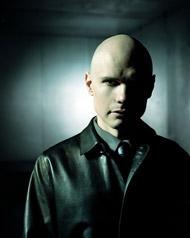BackTalk: Billy Corgan

Besides giving your album a definite retro-'80s feel, it seems like you consciously avoided the heavy drum sound you've been associated with over the years. You're right. I've learned a lot from painters, actually. They'll lead you to a first impression of a work, but then the more you look at it, the more you realize they've sort of tricked you. That's what I think I've done here. I sort of trick you into a comfortable feeling. But if you listen closely to the chord structures and the melodies, it's actually very avant-garde for pop. It's kind of what the Beach Boys did. On the surface, they were a simple rock/pop act, but underneath, they had a lot of sophistication.
The only person I want to work with when I'm recording drums is Jimmy [Chamberlin], and when you put me and Jimmy together, it's Smashing Pumpkins. So if I want to do something different - and I did want to do something different with this album - I have to avoid that. I consciously restricted myself to certain tones and certain approaches, and in doing so, I learned all these new methods. If I started the album with my normal formula, I was going to get the same results. So I learned this trick: If you make people feel comfortable, they'll go with you. If you make them feel uncomfortable - "Okay, here's this big challenge: climb this big hill, there's this golden land of notes ahead" - that's too much for a lot of people to handle. You gotta bring them in a little bit first.
Lindsey Buckingham is like that, in a lot of ways - with Fleetwood Mac's Tusk, for instance. There's a comfort zone in a lot of those songs, but when you get to things like "The Ledge," you're like, "Wait a minute! There's something else going on here." That's funny you bring up Lindsey because he's somebody I'd actually listen to. He's one of the few people I'd like to work with, so I'm calling out to Lindsey: Please help me. [Corgan smiles and winks]
Well, that might be arranged. You guys are label mates, right? Yeah. I'm living off the money he earned. [both laugh]
He also referred to the painter analogy and that visual sense when he and I talked about the way he creates music. I didn't know that about him. I would classify a lot of TheFutureEmbrace as musical impressionism. You listen to it, and there's that comfortable, "Oh, I kinda know what this is about." Like Talk Talk - we talked about them when making this record. And we also talked about Sisters of Mercy, and how bands like that achieved their sound.
There's an '80s goth feel to some of this record. It was on purpose. Once you get past that, it gets a little scary. [chuckles]
Is there anything left over for B-sides? I was really an adult on this one. I tried to stay focused on the album's songs. On top of what's there, there are another 20 ideas. But unlike Pumpkins, where we'd develop ideas until they were almost all the way done, this time, I dropped them before they got that far. We kept having what we called Nero moments with the thumb. [both laugh] You know, we'd play the song, and then everyone would look at me. I'd give it the thumbs down, and heads would drop. "No, I love that idea. We can't kill that one." And I'm like, "All right, tell me how to make it work." And everybody scratches their heads. So, all right, next.
I learned my lesson. I think one fair criticism of me over the past few years is that the work was too sprawling, too diverse. On the one hand, I was thinking I should pursue whatever musical vision I have. But it's a lot to ask a listener to follow you down every little rabbit hole. So I was pretty convinced that the best way to do this would be to make a very focused, concise record where, if you liked one song, you'd like the whole album. I had a consistent sound, a consistent vision that I really worked toward like I hadn't since probably '92 or '93. It only took about 11 years for the criticism to sink in. [laughs]
- Log in or register to post comments





























































